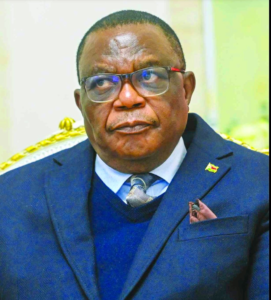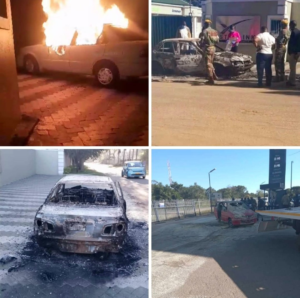ZIMBABWE’S POWER PLAY: ‘PRESIDENT’ MNANGAGWA TIGHTENS GRIP ON GOVERNANCE

In a bold move that signals a significant shift in the political landscape of Zimbabwe, President Emmerson Mnangagwa has taken decisive steps to consolidate authority, bringing 13 pivotal laws under his direct control. This strategic maneuver not only broadens his influence across key sectors of governance but also marks a pronounced move towards a more centralized rule, raising eyebrows and igniting discussions about the future of democracy in the nation.
At the heart of this political realignment are institutions of critical importance, including the Anti-Corruption Commission, the Sovereign Wealth Fund, and notably, the domain of electronic surveillance. With these sectors now firmly within his grasp, President Mnangagwa’s reach extends over areas essential for national stability and integrity. Furthermore, his newfound authority to independently determine his Presidential Salary and Pension is viewed by many as a stark indication of the extent to which he is fortifying his position at the helm of Zimbabwe’s governance.
This concerted effort to centralize power can be seen as a double-edged sword. Proponents may argue that such a move is a step towards ensuring a more streamlined and efficient decision-making process at the state’s highest levels. The consolidation could ostensibly reduce bureaucratic red tape, facilitate quicker responses to national issues, and promote a unified strategy in economic and anti-corruption efforts.
However, critics are sounding alarms over what they perceive as a clear trajectory towards autocracy. The centralization of such significant powers in the hands of a single individual, they argue, could pose a grave threat to the principles of democracy and accountability that are cornerstone to any free and fair society. By placing the Anti-Corruption Commission under presidential control, President Mnangagwa positions himself as the ultimate judge of integrity within the government, a move that could potentially undermine the institution’s objective of ensuring transparency and accountability.
The inclusion of the Sovereign Wealth Fund and electronic surveillance under the president’s domain further complicates the narrative. While the former is crucial for economic stability and investment, the latter raises profound concerns about privacy, freedom of expression, and the potential for governmental overreach in monitoring citizen communications.
Moreover, the autonomy to set his own financial remuneration underscores a level of self-governance that may not sit well with the populace, particularly in a country facing economic challenges. Such a move could be perceived as self-serving, casting shadows over the motives behind this sweeping consolidation of power.
President Mnangagwa’s strategy is reflective of a global trend where leaders seek to centralize control, often justified as a means to enhance governance efficiency. Yet, the implications of these actions on democratic principles and accountability cannot be overlooked. As Zimbabwe navigates this new political era under Mnangagwa’s increasingly centralized rule, the balance between effective governance and the preservation of democratic freedoms remains a critical concern.
The unfolding developments in Zimbabwe stand as a testament to the intricate dance between the pursuit of centralized governance and the maintenance of democratic ethos. As President Mnangagwa asserts his authority, the world watches closely, pondering the future trajectory of Zimbabwean democracy and the broader implications for governance models in the global arena.




You’ve done a remarkable job in dissecting the complexities of Zimbabwe’s political landscape under ED’s recent actions. The depth of your analysis on the implications of centralizing power within the presidency, especially concerning the Anti-Corruption Commission, Sovereign Wealth Fund, and electronic surveillance, offers readers a comprehensive understanding of what’s at stake. Your balanced perspective, acknowledging both the potential efficiencies and the risks to democratic principles, provides much-needed nuance to the conversation.
We made a terrible mistake in 2017 when we celebrated this rebranded dictator with blood in his hands. He is worse than Mugabe in my books and he will do anything to stay in power. He is greedy and more corrupt and he is unelectable